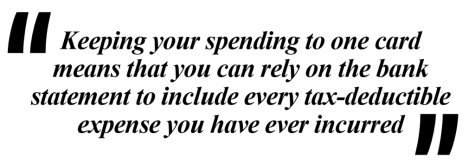Archived article
Please note that tax, investment, pension and ISA rules can change and the information and any views contained in this article may now be inaccurate.
Personal finance tips for small business owners

Careful money management and keeping a lid on costs is vital when you’re running a small business, especially in the current environment of exceptional challenges.
UK small businesses lost £2.2 billion in revenue for goods and services provided during lockdown as their customers become insolvent. Meanwhile the average small business is still owed almost £60,000 for work done before lockdown, according to September survey carried out by credit insurer Nimbla.
So what can small business owners do to remain in control of their finances during these tough times? Which financial services brands are most likely to help them, and how can technology play a part?
THE IMPORTANCE OF CASH PLANNING
Mahmood Reza is founder of Pro Active Resolutions, which offers business support and accountancy services to entrepreneurs. He advises his clients to plan their cash flows a year ahead.
‘One thing I would recommend they do is get some idea of a cash plan in front of them for the next 12 months to make sure they don’t run out of cash. It can even be a simple Excel spreadsheet or Google Sheet which says “money in, money out” so they can link it to their personal finances as well as their business finances. Most owners will try and build their business up and they just run out of that vital ingredient of cash,’ says Reza.
He adds that many entrepreneurs focus on growing sales, when really they should be thinking about how much profit they are taking from each transaction, if their business is to be sustainable.
That means setting pricing in line with what your costs are and how much profit you want to make. ‘Most business owners underprice themselves and don’t factor in their own time,’ Reza notes.
‘PROFIT FIRST’ MENTALITY
This is something Webster agrees with, as he now follows a ‘profit first’ mentality and allocates 10% to 20% of revenues to pay his company’s directors. He says he knows a lot of outwardly successful entrepreneurs who are actually ‘cash poor’ because they pay themselves last.
Reza also suggests that, as part of their cash planning, business owners set aside at least 10p in the pound to cover future tax bills, and make sure they are using all the allowances they are entitled to, such as tax relief on working from home expenses, travel, phones and training courses.
When it comes to expenses, Jon Rata, director of JP Rata Chartered Accountants, recommends that business owners put all of them on one business bank card, to make it easier to keep track.
‘No cash, no personal credit card, no expenses claims,’ he advises. ‘Keeping your spending to one card means that you can rely on the bank statement to include every tax-deductible expense you have ever incurred.
‘Then, buy everything for your home life on your personal bank card. It cuts down the time you waste bookkeeping your personal spend and also makes it so easy to see how much money you’ve made.’
How one entrepreneur uses tech to make savings
Mark Webster is a serial entrepreneur who co-founded Authority Hacker, a small business delivering training courses to website owners.
His first start-up had ‘terrible money management’, he says, to the point that the company struggled to meet its expenses, including its largest one – payroll. With no cash savings to fall back on, a large late payment was the final straw.
‘Cash flow was a mess, we lost thousands to bank and exchange fees, missed out on a load of tax deductions and even didn’t have enough money to pay employees at Christmas once.’
He had to borrow from a friend’s company to get out of that situation, and now he knows his cash flow situation inside out, using a ‘tech stack’ of money management tools to stay on top of things. ‘This setup is cheap to run and has
cut our banking costs by around 400%,’ says Webster.
He uses cloud accounting service Xero as his core tool to manage invoices and keep an eye on profit and loss, and Hubdoc for uploading digital receipts and tracking expenses. Revolut for Business allows him to give staff virtual credit card numbers for online purchases which can be easily monitored.
Because his company sells internationally, he uses Transferwise to keep fees
down on foreign currency transactions. Webster puts aside the company’s cash for future taxes into a savings account with Shawbrook Bank which earns a few hundred pounds a year in interest.
He reviews costs and expenses every quarter by looking at how much things like subscriptions cost on an annual basis. ‘A lot of our expenses are software tools which inevitably have a monthly cost. While, say, £29 a month might not seem like much, that’s £348 over a year, so it is worth taking a look at.’
BANKS AND PAYMENT SERVICES
Choosing the right financial service providers is important for SMEs because you want to give your business to companies that make your life easier. But it’s not just about ease of day-to-day banking – some companies can offer you valuable extra services to grow your business.
For example, Stephanie Buckley, director of The Insolvency Company, says NatWest has been ‘incredible’ for her business, which has taken advantage of its Entrepreneur Accelerator programme offering fully-funded mentoring and training to SMEs.
‘The mentoring we have had has been of the highest quality and it has introduced us to so many other businesses like ours in terms of size and aspirations,’ she says. Buckley also recommends Card Cutters which her business uses for card payments.
Financial acumen is so important when you’re trying to make a success of your small business. With careful money management, your company could thrive even in these difficult times.
Important information:
These articles are provided by Shares magazine which is published by AJ Bell Media, a part of AJ Bell. Shares is not written by AJ Bell.
Shares is provided for your general information and use and is not a personal recommendation to invest. It is not intended to be relied upon by you in making or not making any investment decisions. The investments referred to in these articles will not be suitable for all investors. If in doubt please seek appropriate independent financial advice.
Investors acting on the information in these articles do so at their own risk and AJ Bell Media and its staff do not accept liability for losses suffered by investors as a result of their investment decisions.
Issue contents
Editor's View
Exchange-Traded Funds
Feature
First-time Investor
Great Ideas
Money Matters
News
- Regulators on both sides of the pond size up big tech targets
- AIM index regains strength and US tech stocks rally again
- Leisure sector hit by Boris’ latest lockdown restrictions
- Vodafone could raise stakes in TalkTalk buyout battle
- Hipgnosis rival Round Hill Music to float new trust on UK stock market
- Forget tech, solar and clean energy is the hot sector in 2020
 magazine
magazine









